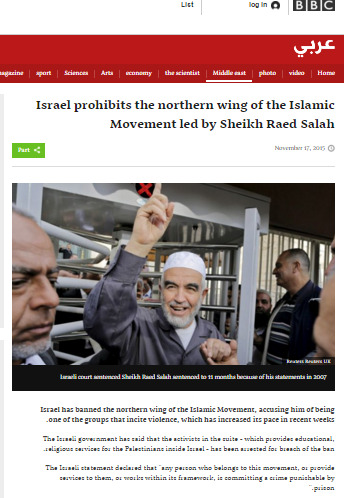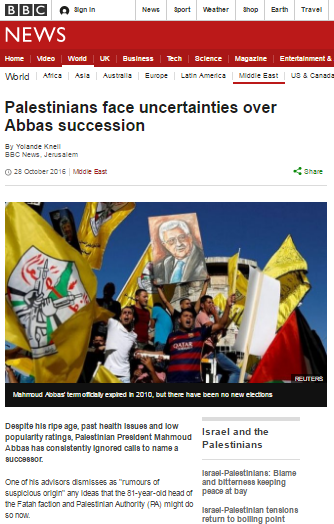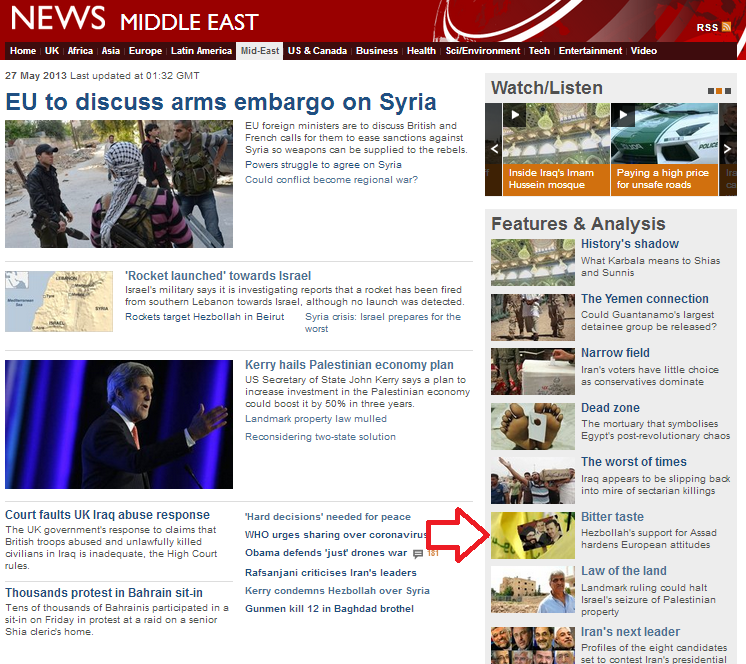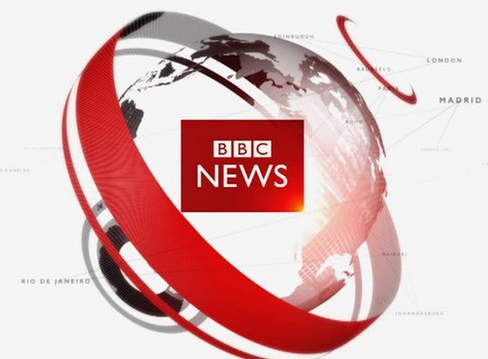As readers may recall, the BBC’s standard narrative on the topic of Israeli construction in Area C and the parts of Jerusalem that were under Jordanian occupation between 1948 and 1967 was contradicted by its own reporting in March of this year when it had to tell audiences that “Israel has approved the establishment of its first new Jewish settlement in the occupied West Bank in two decades”.
Another stage in that particular building plan was reached on June 20th when work began on preparations for the laying of infrastructure at the site. Curiously, the production team at the BBC Radio 4 programme ‘The World Tonight’ decided that event justified a report over eight minutes long and the resulting item is particularly notable on several counts.
1) Although the item concerns Israeli construction, it did not include any response from Israeli officials: the two Israeli politicians heard in the report were not speaking to the BBC.
2) The item did however present the Palestinian Authority’s reaction to the story and ostensibly neutral back-up was brought in to reinforce the PA’s messaging.
3) Presenter Ritula Shah repeatedly referred to an ‘announcement’ concerning the building of a new ‘settlement’ without clarifying to listeners that it is the same project that they already heard about in February and March of this year.
4) Listeners heard an inaccurate and partial representation of ‘international law’ concerning Israeli communities in disputed areas.
The item (from 23:45 here) was introduced by Ritula Shah as follows:
[all emphasis in italics in the original, all emphasis in bold added]
Shah: “When Donald Trump met the Israeli Prime Minister Benjamin Netanyahu at the White House in February he had this to say about settlements and the crucial question of whether any peace deal should work towards separate Israeli and Palestinian states or just a single state.”
Listeners then heard an edited recording dating from February 2017:
Recording Trump: “As far as settlements; I’d like to see you hold back on settlements for a little bit. I would like to see a deal being made. I think a deal will be made. [edit] That’s a possibility. So let’s see what we do. [edit] So I’m looking at two-state and one-state and I like the one that both parties like. I’m very happy with the one that both parties like. I can live with either one. I thought for a while that two-state looked like it may be the easier of the two.”
Shah continued:
Shah: “Well this morning Mr Netanyahu tweeted a picture of a bulldozer and a digger breaking ground on a rocky hill. His message read ‘after dozens [actually ‘tens’ – Ed.] of years I have the privilege to be the prime minister building a new settlement in Judea and Samaria’ – that’s the Hebrew term for the West Bank. Known as Amichai, this will be the first new Jewish settlement in the occupied West Bank for more than twenty years.”
That statement is of course accurate but that fact was soon forgotten as the item progressed. Shah then gave the BBC’s usual partial mantra on ‘international law’ which fails to inform audiences of the existence of alternative legal opinions. She continued with an ‘explanation’ of that ‘international law’ which is patently inaccurate: those who do claim that ‘settlements are illegal’ do so citing Article 49 of the 4th Geneva Convention – not because of any Palestinian claims to the disputed land.
Shah: “Settlements are illegal under international law – although Israel disputes this – as they’re built on land the Palestinians claim for a future state. Amichai will accommodate some 40 families whose homes were cleared from the unauthorised settler post of Amona and its creation has been welcomed by the settler movement. Motti Yogev is a member of the Knesset for the far-right Jewish home party.”
A translated voice-over of a recording of MK Yogev speaking was then heard.
Recording Yogev voice-over: “Here the settlement of Amichai will be built and established for those evicted from Amona and will strengthen our hold in the very heart of the land of Israel.”
For reasons best known to the programme’s production team, Shah then went on to mention a completely unrelated meeting held by the Israeli prime minister on June 20th:
Shah: “Well somewhat incongruously Mr Netanyahu met a delegation of former American football players today. And although he chose not to speak about the settlement decision, he did draw some parallels between their game and leading Israel.”
Recording Netanyahu: “If you’re not strong you’ll never get peace and if you’re not strong you’ll be in war, in turmoil and the worst thing is you lose. So I’m sure when you prepare for your games you don’t say ‘well, do I need to be strong, fast, nimble’. Is that a question? No; your game is not different from ours. The only difference is, if we lose the consequences are immutable. And we’ve had enough of that in our history so we won’t let that happen again.”
Listeners next heard Palestinian Authority messaging on the topic of Netanyahu’s Tweet, with Shah neglecting to inform listeners that the PA spokesman concerned had been appointed to the Fatah Central Committee the previous day.
Shah: “Well today’s announcement comes as President Trump’s son-in-law and advisor Jared Kushner is due in Israel tomorrow to take part in talks on restarting the peace process. Nabil Abu Rudeinah is a spokesman for the Palestinian president Mahmoud Abbas. He called today’s move a grave escalation and questioned the timing.”
Recording Abu Rudeinah: “The resumption of these activities is a clear message to the American administration and to the efforts of President Trump. The American envoy is already in the area. Tomorrow President Abbas will be receiving him. This is an obstacle to the efforts of President Trump to resume the peace process.”
Shah then brought in her ostensibly ‘neutral’ back up – clearly intended to reinforce that PA messaging. She did not, however, bother to inform the audience that her interviewee was previously Algeria’s foreign minister and an Arab League envoy. As Shah told listeners, on the same day as this report was broadcast Lakhdar Brahimi was at the UNSC. At that meeting, Brahimi quoted a woman from Gaza whom he said told him that “Israel has put us in a concentration camp” but of course Radio 4 listeners were not told of the use of that inaccurate and offensive terminology before they heard from the ‘neutral’ commentator.
Shah: “Lakhdar Brahimi is a former senior diplomat. He’s now a member of the Elders – the independent group of global leaders founded by Nelson Mandela. He was speaking about the Israeli-Palestinian question at the UN Security Council in New York today. I asked him what today’s announcement of a new settlement might mean for securing peace.”
Brahimi promoted the old canard – frequently heard by BBC audiences – whereby ‘settlements’ are the main obstacle to peace.
Brahimi: “I don’t think it’s very good news for Palestine [sic], for Israel, for the people who want settlement of this problem. The biggest hurdle to peace is the settlement activity and the international community – the United Nations – have called again and again for it to stop. Successive American administrations have done the same; evidently without raising their voice really.”
Shah then supposedly ticked the impartiality box but failed to clarify to audiences that until the Obama administration demanded a construction freeze in 2009, negotiations between Israel and the Palestinians took place regardless of the rate of Israeli building, that during the first nine months of a ten month freeze on construction in 2009/10, the Palestinians failed to come to the negotiating table or that when every last Israeli community was removed from the Gaza Strip in 2005, the ‘peace process’ did not progress.
Shah: “But Israel suggests that building settlements is not an impediment to peace and indeed the idea has an awful lot of support in some sections of the Israeli population.”
Brahimi: “Yeah it has a lot of support in the section of the Israeli population who think that all Palestine belong to them from the river to the sea and that the Palestinians had better go somewhere else. This is clearly not the view of the international community. I think there is near unanimity there. Even their best supporters who are the Americans think that yes, settlement activity is an impediment to peace.”
Shah did not at that juncture bother to remind her listeners – or her interviewee – that the League of Nations assigned what Brahimi described as “all Palestine” to the creation of a homeland for the Jewish people. She continued:
Shah: “Are you confident that the Americans’ position hasn’t changed? After all, today Jason Greenblatt – a Trump advisor on Israel – met Mr Netanyahu and Jared Kushner arrives in Israel tomorrow – a very senior Trump advisor. That doesn’t necessarily suggest an Israeli government that is worried about US reaction.”
Brahimi: “They probably are not because even with previous administrations, they have always managed to let, you know…maybe there is a little bit of anger or a statement here or there but at the end of the day the Americans let them do what they want. Lately Mr Trump has said very mildly that perhaps, you know, you should slow down settlement building it will be good, but not much more than that.”
Shah next gave Brahimi the cue for reinforcement of the previously heard PA messaging and further promotion of the notion that construction of homes for 40 families in Area C is intended to sabotage American diplomatic efforts.
Shah: “Well do you then support the Palestinian president’s spokesman when he suggested that today’s news – he called it a grave escalation and an effort…an attempt to foil efforts by the American administration to revive negotiations. Does it seem like that to you? Is it deliberate?”
Brahimi: “I’m sure it is deliberate. I’m sure that…”
Shah [interrupts]: “Because of the timing.”
Brahimi: “Yeah. You know it’s not the first time that they do that. You remember when the vice-president with Mr Obama…on the day of his visit they announced the building of 3,000 – or I don’t know how many – settlement units. I think it must be a message to the Americans that you speak about peace but then the peace is what we think it is – not what you or anybody else say it is.”
Shah refrained from clarifying to listeners that the 2010 announcement to which Brahimi referred related to construction of 1,600 housing units in the Jerusalem neighbourhood of Ramat Shlomo that had already been in the pipeline for three years when VP Biden arrived in Israel or that the construction freeze which was in effect at the time did not include Jerusalem. Neither did she bother to tell listeners that the same Nabi Abu Rudeinah said at the time that the project was “a dangerous decision that will torpedo the negotiations and sentence the American efforts to complete failure” even as the PA continued to refuse to come to the negotiating table despite the settlement freeze. Shah continued with more impartiality box ticking:
Shah: “But if there is to be international pressure on the Israelis, surely there also has to be international pressure brought to bear on the Palestinians, on Hamas to recognise the State of Israel, to renounce violence and so on.”
Brahimi: “Yes absolutely. There is a minority amongst the Palestinians, including within Hamas, who, you know, saying that, you know, all Palestine is ours and that we don’t want to recognise Israel. Or some others who say we don’t want to recognise Israel until they recognise us. On the Israeli side there is a minority just as extremist as that.”
Failing to challenge that equivalence between Israelis and a terrorist organisation and refraining from reminding her listeners that “minority” Hamas – with its platform of destruction of Israel – won Palestinian elections the last time they were held, Shah closed the item.
Shah: “So just finally then, judging by what you’ve been saying, do you have any hope that there could be progress in the peace talks in the near future?”
Brahimi: “I think it would not be realistic to say that today, tomorrow and after tomorrow we are going to move towards the kind of peace that, once again, the international community wants, that a lot of Israelis want and of course the overwhelming majority of the Palestinians. I don’t think it would be realistic to say that we’re going that way anytime soon.”
Shah: “The diplomat Lakhdar Brahimi.”
While this entire item was ostensibly built around one Tweet from the Israeli prime minister it is of course blatantly obvious that was merely a hook upon which to hang yet another chapter in the BBC’s long-standing politically motivated portrayal of Israeli construction as the prime factor preventing resolution of the Palestinian-Israeli conflict.
Related Articles:
Examining the BBC’s claim that Israeli building endangers the two state solution
The BBC’s inaccurate and misleading representation of Israeli building – part one
The BBC’s inaccurate and misleading representation of Israeli building – part two
BBC contradicts years of its own narrative on Israeli construction
How the BBC invents ‘new settlements’ with lax language
Quantifying BBC ‘due impartiality’ on ‘international law’




